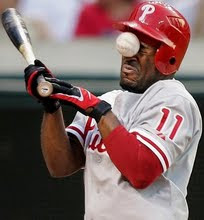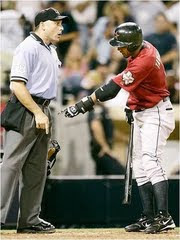I know this is a fact I have brought up many times in private football conversations with friends but I don't think I have done so a whole lot publicly on GOI. I've always wanted to chart to see how many interceptions a QB really should have gotten credited to him. One year I was just going to do it for the Bears quarterback since I watch every game, but Football Outsiders has beaten me to the punch.
When I first saw what FO did, I practically ejaculated in my pants. It's the data I've always wanted to compile and had hoped some one would do it for me. Or I'd find the time to do it, publish my findings and be the next Voros McCracken for football. But alas, FO has done the work and here is their findings (through Week 14).
Football Outsiders have broken the interceptions into four categories: actual official score card interceptions (1), interceptions off of hail marys (2), interceptions that were the receivers fault (3), and interceptions that were dropped by the defender (4). Then, using kindergarten math, they calculated the quarterback's "true" INT rate by doing: 1 + 4 - 2 - 3.
You can read the full article here or see the results below (click to enlarge):



Some quick notes:
- It seems to be that Mark Sanchez has not really improved at all from his rookie year. The major difference between 2009 Sanchez and 2010 Sanchez (besides learning how to slide) was the interception rate. It seemed as though Sanchez had been making better decisions this year. But it looks like he is just getting extremely lucky this year.
- It's disheartening to see Jay Cutler so high, but not surprising. I still am under the contention that he truly is great QB but his supporting staff is really bad (mainly his offensive line. And also his receivers). Also, because I'm a Cutler supporter, guys like Derek Anderson are lowered because they haven't played as many games as Cutler. I think if Anderson had gotten as any attempts as Cutler had, Anderson would probably lead this list.
- In 2009, against the Packers, Jay Cutler threw four interceptions. At least two of them were the receivers fault yet probably would not be included in this analysis. I remember a particular play where Jay Cutler was throwing in a zone and not to a particular player. However, Johnny Knox cut left when the play was designed for Knox to cut right. Therefore, Cutler did what he was supposed to do and threw it where he should have, but there was no receiver there so the pass got intercepted. I'm under the firm belief that those should not count as INTs towards the QB, but fully admit plays like those are extremely hard to quantify.
- I'm very happy to see Peyton Manning's name up there because he's truly having a pretty bad season and the biggest reason for that is that he's been a turn over machine. Why is it that in 2009 when Manning had Wayne, Collie, and Garcon for receivers and Manning played well, everyone was praising Manning for being able to work with anyone. Yet in 2010 when Manning is having a bad year and also playing with Wayne, Collie, and Garcon that Manning gets a free pass because he's playing with shitty receivers?
___________________________
EDITOR'S NOTE: After a night to rest and think about it, I'm not 100% sure how I feel about adding defender's drops into this equation. On one hand, I think adding it is a good indicator for the decision making of the quarterback and a good predictor or next year. But on the other, the final result of the play didn't affect anything. An interception is extremely costly to a team because it not only does it prevent you from scoring, it makes it easier for your opponent to score. If you look at statistics like passer rating, WAR, and EPA and such, interceptions bring down your numbers drastically. But when a defender drops an interception, the drive still continues. You still have a chance to score and your opponent does not because at the end of the day, there was not an interception.







1 comments:
GREAT ARTICLE!!!!!!!!
Post a Comment